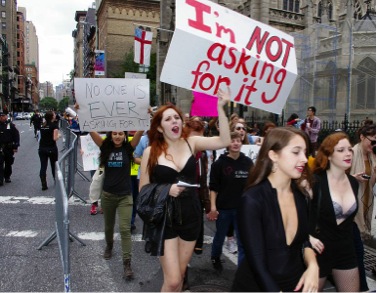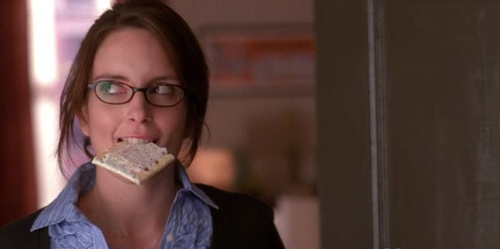Comedy as Feminist Rhetoric, Liz Lemon Style
Or, "That was an ironic reappropriation… I don’t know anymore"
Risa Polansky Shiman
Given the stereotypes that come along with traditional feminist activism—She’s a feminist. She looks angry, and I can see from here she’s not wearing a bra—and the frustration feminists often face as a result, comedy is an entertaining, and therefore presumably palatable, way to expose contemporary feminist issues to broad audiences. But is it effective? A fan of ironic, silly, and sometimes (shhh, don’t tell) lewd humor, I’m no stranger to The Looks, which range from "I don’t get it" to "You’re not as funny as you think you are" to "I am both disgusted and offended." When it comes to comedy, we simply don’t all speak the same language. Consequently, comedy as feminist rhetoric can be a dangerous business: sardonic, self-deprecating jokes being interpreted literally can reinforce feminist stereotypes rather than trouble them. So, is poking fun at women's issues in order to examine women's issues worth it? Must all messages be direct and hardcore to classify as feminist rhetoric? Here, I examine these questions using NBC’s 30 Rock. Caution: menstruation jokes ahead.
Watch and enjoy (or take offense—totally up to you):
These scenes from TGS with Tracy Jordan, the fictional sketch comedy show-within-a-show featured on NBC’s 30 Rock, are, in a wacky little nutshell, apt parodies of how the Emmy-Award-winning series operates – and the potential dangers its comedic rhetoric poses. 30 Rock, brainchild of writer/actor/producer Tina Fey, takes female stereotypes and contemporary feminist issues and, using silly and ironic humor (ahem, see above), challenges them.
But wait... is it challenging them? Or simply reinforcing them? Comedy may be one of the most palatable ways to address and examine feminist issues today given the stereotypes that come along with traditional feminist activism (humorlessness, mannishness, lots of other negative -nesses). But how effective is comedy as feminist rhetoric?
It’s not easy to send a feminist message that people feel like they haven’t heard before, and moreover, that doesn’t immediately categorize the rhetorician as a masculine, man-eating, bra-burning feminist lunatic on her period and on the warpath. Rhetoric scholar Eve Wiederhold calls this dilemma "representational fatigue."
Representational Fatigue
Or, "I want to roll my eyes right now, but the doctor says that if I keep doing it, my ocular muscles might spasm and eject my eyeballs." -LL
Wiederhold explains it this way: "an embodied state that combines agitation with weariness as one negotiates fantasies of verbal retaliation with semantic deficiencies effectuated by inadequate language systems, as well as one’s own uncertainties." Or, in other words (mine): "frustration-slash-paranoia that no one is listening to me and anyone who is probably thinks I’m angry and butch and menstrual and crazy, anyway. And wait... am I?"
The Tina Feys and Sarah Silvermans of the world may have found a way around this: comedy. Even if people are laughing at contemporary women’s issues, at least they’re thinking about contemporary women’s issues... right? But snarky humor as rhetoric can be a dangerous business. What might be intended as feminist commentary could turn into, or be interpreted as, exactly the opposite. Questions about feminism might be read as statements about feminism, and negative statements at that.
Sardonic humor has the potential to start a dialogue about topics that otherwise seem overdone and tired and whiny, as well as to explore and to raise questions about concepts that are controversial or just plain confusing, which I would (and I will) argue could be the method behind 30 Rock’s madness. But, if taken literally, it also has the potential to fortify the very stereotypes feminists are fighting.

SlutWalk marchers in New York City, October 2011,
by David_Shankbone on Flickr
Take, for instance, the ongoing SlutWalk movement, in which women march in revealing outfits in an attempt to reclaim the word "slut" and battle the perception that scanty dress is an invitation for assault. New York Times Magazine contributor Rebecca Traister in "Ladies, We Have a Problem" points out that, "while the mission of SlutWalks is crucial, the package is confusing and leaves young feminists open to the very kinds of attacks they are battling."
The same goes for tongue-in-cheek, ironically anti-feminist feminist comedy: crucial message, potentially confusing package. So, is the possibility of epic backfire worth it? What’s a girl to do?
Meet Liz Lemon
Or, "Hey, nerds! Who's got two thumbs, speaks limited French, and hasn't cried once today? This moi." -LL

I Love Liz Lemon,
by jtbrennan on Flickr
30 Rock creator Fey chooses comedy despite these potential pitfalls. On the show, she plays Liz Lemon, head writer of the aforementioned variety show TGS, a single woman in her early forties known for her appetite, socially awkward tendencies, and dating woes.
In a bit from the show’s pilot, oft-quoted in articles addressing Fey and feminism (and there are many), Lemon’s boss/mentor Jack Donaghy, a caricature of a self-important chauvinist played by Alec Baldwin, describes her this way: "New York, third-wave feminist, college-educated, single and pretending to be happy about it, over-scheduled, under sexed, you buy any magazine that says ‘healthy body image’ on the cover, and every two years you take up knitting for a week."
As Donaghy does here, the show often addresses head-on Lemon’s struggles with feminism, femininity, and identity, effectively zooming in on contemporary women’s own insecurities and troubles—using comedy as the weapon of choice, of course.
Exhibit A: The "Oh no – my period!" scenes we enjoyed (or at least watched) earlier. In the episode titled "TGS Hates Women," Lemon is horrified to read that her favorite feminist website, JoanofSnark.com, has accused TGS of, you guessed it, "hating women."
Lemon is at first indignant, quick to point out that the last episode of the show heavily featured its female lead. But the menstrual montage that follows makes clear that simply having a woman star does not a pro-female show make. Each sketch ends with a shout of, all together now: "Oh no – my period!"
Isn't It Ironic? ISN'T IT?
Or, "I will not calm down! Women are allowed to get angrier than men about double standards." -LL
Lemon’s first reaction is to argue that the sketches are "ironic reappropriation[s]," but before the rationalization can begin in earnest, she trails off, confused and ashamed, admitting that she doesn’t "know anymore."
The episode not only tackles relevant feminist issues, but also questions the message that comedy as feminist rhetoric sends (sound familiar?)—perhaps even the message that 30 Rock itself sends. It’s a strong example of the show’s signature tongue-in-cheek, self-deprecating humor.
Case in point: even after the realization hits her like a lightning bolt that parodying women on TGS may be hurting the feminist cause, Lemon clutches her gut as something else hits her, also like a lightning bolt, only more ironic.
"Ugh, my period!" she cries. And as she drops to the floor before her writing staff: "You’re all fired!"
This is 30 Rock’s M.O. – taking its bits one step further than expected, turning the statements it makes on their heads. It’s funny. But is it effective?
Backlash
Or, "I don't think you wanna take advice from me on this. I ate a Three Musketeers bar for lunch and this bra is held together by tape." -LL
Hating women is an allegation Fey herself has not escaped, not just from folks who take the show’s humor literally and take offense—that stuff’s just standard when it comes to raunchy comedy—but from would-be and one-time fans who hoped for, who expected, the perfect feminist comedy (whatever that is) in 30 Rock.
Critics have lamented (and lambasted), among other issues, the show’s reliance on lonely single girl jokes and the focus placed on food. They’ve rolled their eyes at what they see as the overdone and implausible conception of Lemon, played by the comely Fey, as unattractive. All this the prolific Rebecca Traister points out in Salon’s “The Tina Fey Backlash.” Criticism has at times been so rampant that The New Yorker’s Emily Nussbaum even felt the need to stand up “In Defense of Liz Lemon.”
Ultimately, both writers conclude that neither Fey nor Lemon elected herself poster child for feminism in the first place. Perhaps Fey isn’t the feminist icon many hoped for and/or assumed she was—but she never asked nor purported to be, Traister muses in her "Backlash" article.
Nussbaum makes the same point about Lemon and 30 Rock: "Someone needs to speak up for the Lemon, and for the Fey," she writes. "Because from the beginning Liz Lemon was pathetic." Case in point: Jack’s description of Liz as a wishy-washy wannabe feminist in the show’s very first episode.
This analysis supports the idea that 30 Rock isn’t necessarily out to send a staunch feminist message, anyway—that the aim is rather to acknowledge and probe the complexity of feminism and its intrinsic struggles.
Traister in Salon says it better, astutely noting that "Fey has often presented herself as emblematic of the inconsistencies inherent in contemporary feminism"—which is different than presenting oneself (or one’s show) as emblematic of feminism itself.
I agree, and I’ll take it a step further in asserting that Fey’s use of comedy as rhetoric is where the confusion—the "backlash"—really comes in. An appointed feminist icon not only exposing and exploring questions about womanhood and feminism, but using jokes (with women as the butts, no less) to expose and explore questions about womanhood and feminism may be, and has been, seen as undermining the feminist cause—a prime example of the potential for divisiveness in wry comedy that addresses women’s issues.
Sardonic humor and the myriad ways it can be interpreted and misinterpreted only compounds the problems that both Traister and Nussbaum have acknowledged in addressing the Fey backlash.
But it just seems to me that Fey, if Liz Lemon is any indication, may trouble over, or is at least aware of, some of the very same questions (a nice word for "accusations") critics have raised about where she stands when feminism is concerned, and that she’s simply being honest about it. And what’s wrong with honesty? What’s wrong with laughing at yourself?
It may not be the kind of hardcore feminist activism some are looking for. It may be interpreted literally and misunderstood. But it also may very well resonate with women attempting to understand their own feminist identities (i.e., this moi).
And given that, when it comes to women’s issues, many folks out there are at best desensitized and at worst plain sick of it all, sardonic comedy might be the most viable way to explore all this – something I believe Fey has seized on.
Not, as Traister observes, with the hope of solving feminist problems (or of reigning supreme as queen of the feminists), but instead with the aim of probing them, of starting a discussion about them—for herself, for Lemon, for the rest of us who may be struggling with the same issues, questions, contradictions.
Sure, this has sparked quite the controversy in the blogosphere (blergosphere?)… but hey, people are talking, aren’t they? And besides, if you really think about it, are direct, decorous feminist demonstrations any less divisive?
Listening Is Better Than Not Listening, And When Tina Speaks, People Listen.
Or, "There ain’t no party like a Liz Lemon party ’cause a Liz Lemon party is mandatory." -LL
It all comes back to the idea of representational fatigue. When a woman steps onto the proverbial soapbox with a public service announcement about sexism, you can almost hear the collective yawn, can almost feel the whoosh as thousands flee from what they can only assume is a braless man-hater with a glass-ceiling complex.
Is that any worse than critics accusing Fey and 30 Rock of not doing feminism right? Any worse than someone thinking Jack Donaghy is right when he tells Lemon that "feminism is an evolutionary fact... If you try to breed it out of them, you end up with a lesbian with hip dysplasia"?
I say no. Because at least when it comes out of the mouth of Jack Donaghy or Liz Lemon, people are listening—and even better, they’re talking.

SlutWalk marchers in Knoxville, October 2011,
by Brian Stansberry on Wikimedia Commons
Traister, in her New York Times Magazine SlutWalk analysis, asserts the same: that it is not only the humorous and easily misinterpreted feminist rhetorical acts that have the potential to cause trouble. "The most sophisticated attempts elicit just as much derision and, frankly, receive a fraction of the attention," she writes. "All of which suggests that while clumsy stabs at righting sexual-power imbalances may be frustrating, they remain necessary."
Given the potential for misinterpretation, 30 Rock’s unique brand of ironic and self-deprecating humor could certainly qualify as, to use Traister’s word, "clumsy." And while it does not seem to be 30 Rock’s mission to "right sexual-power imbalances," but rather to expose them and to question them, the show still addresses women’s issues, and millions of people watch the show. That’s the "attention" Traister is talking about.
Sure, 30 Rock may have drolly suggested that Amelia Earhart crashed her plane because of menstrual cramps, but in so doing, the show also exposed—during primetime, no less—the irrationality of a common stereotype, and also raised one of the issues we’re raising here: whether jokes succeed as feminist rhetoric.
Understanding Tina Fey and her comedic style (or very presumptuously purporting to), I believe 30 Rock parodies women’s issues because they’re real and worth talking about. Because they’re complex—sometimes so complex that they’re funny. And because comedy is one way to not only explore these complexities, but to do it in a form that’s more accessible and arguably more palatable to the masses, making it, in my view, worth the risk.
So, it seems Traister’s conclusion applies: yes, comedy as feminist rhetoric (or using comedy to raise questions about feminist rhetoric) can be "clumsy" and "frustrating" and "derisi[ve]" —but it is still feminist rhetoric playing out on the main stage and catching the attention of millions and is, therefore, "necessary."
Certainly not perfect. Certainly not universally impactful. But, in the face of the representational fatigue that plagues contemporary feminists, necessary all the same. The jokes may not be effective every time, and there will always be viewers who take offense, whether they’re watching 30 Rock or another comedy after the show’s seventh and final (waahhh!) season.
But when it comes down to it, there’s no such thing as a rhetorical style guaranteed to reach or to sway everyone, anyway. And though I think Fey’s tactic is a good one, there is no single, surefire way to ask a universally resonant question about feminism, to send a universally effective feminist message.
OK, there is. But shhh, you guys.
The silver bullet for solving all feminist challenges is...
Oh, forget it. My period!
References
"30 Rock: The Obsessive Guide – Best Lines Filter" Vulture. New York Media LLC, 2011-2012. Web. 27 Sept. 2012. http://nymag.com/tv/30-rock/bestlines/
Blackjackstacks. "30 Rock: Oh No My Period!" Online video clip. YouTube. YouTube, 25 Jan. 2012. Web. 24 Sept. 2012. http://www.youtube.com/watch?v=zVgHaTPM38A
FermatSim. "30 Rock: Jack Donaghy analyzes Liz Lemon." Online video clip. YouTube. YouTube, 27 Dec. 2011. Web. 24 Sept. 2012. http://www.youtube.com/user/FermatSim
Liz90Lemon. "Liz Lemon (30 Rock): ‘Oh, my period!!’." Online video clip. YouTube. YouTube, 25 Feb. 2011. Web. 24 Sept. 2012. http://www.youtube.com/watch?v=E66FxJnVVxE
Nussbaum, Emily. "In Defense of Liz Lemon." The New Yorker. Condé Nast, 23 Feb. 2012. Web. 27 Sept. 2012. http://www.newyorker.com/online/blogs/culture/2012/02/in-defense-of-liz-lemon.html
"Pilot." 30 Rock: Season 1. Universal Studios, 2007. Netflix. Web. 3 Oct. 2012. "TGS Hates Women." 30 Rock: Season 5. Universal Studios, 2011. Netflix. Web. 30 Oct. 2011.
Traister, Rebecca. "Ladies, We Have a Problem." The New York Times Magazine. The New York Times Company, 24 July 2011. Web. 8 Oct. 2011. http://www.nytimes.com/2011/07/24/magazine/clumsy-young-feminists.html?pagewanted=all
Traister, Rebecca. "The Tina Fey Backlash." Salon. Salon Media Group Inc., 14 April 2010. Web. 31 Oct. 2011. http://www.salon.com/2010/04/14/tina_fey_backlash/
Wiederhold, Eve. "Feminist Rhetoric and Representational Fatigue." Journal of Advanced Composition (JAC)28.1-2 (2008):, 123-149. Print.
a. The purpose and character of your use:
The copyrighted work quoted and referenced in this scholarly project is intended to raise questions, drive analysis, and provide substantiation for analytical claims. The use is transformative in that all copyrighted work is used as basis for original analysis and commentary that either expands upon or differs from points made in the original works. There is also an element of parody involved in that scenes from a television show are humorously re-interpreted.
b. The nature of the copyrighted work:
The copyrighted work utilized includes textual (magazines, newspapers, blogs, online publications) and video (television sitcom). Proper citations can be found within the work and its accompanying bibliography.
c. The amount and substantiality of the portion taken:
None of the copyrighted works have been reproduced in their entirety. Portions used include quotes and excerpts from published articles and transcribed scenes from sitcom episodes.
d. The effect of the use upon the potential market:
This original, scholarly analysis/commentary should not affect the television or entertainment journalism markets in that all conclusions derived from examining these sources are the opinions of the author. No copyrighted work was reproduced in its entirety, all works are cited, and no profit will be derived from the publication of this essay.